HOME >> CHINA,SPECIAL-COVERAGE
Cyclists experience beauty of authentic northern Xinjiang
By Feng Yu in Bortala Source:Global Times Published: 2019/7/3 18:03:41 Last Updated: 2019/7/4 1:06:38
○ Tour de Sayram Lake Road Cycling Race was held in June in Northwest China's Xinjiang Uyghur Autonomous Region
○ Participants could see Xinjiang's openness and stability through the event
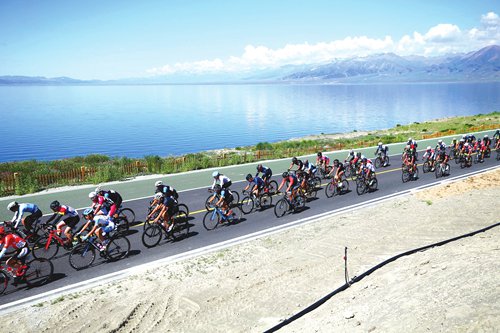
This is the main question asked by people interested in paying a visit to Xinjiang Uyghur Autonomous Region in Northwest China.
The region remains a mysterious place to those who have never been there, foreigners and Chinese alike.
Many questions were answered at the 13th China Xinjiang Tour de Sayram Lake Road Cycling Race, which was held from June 23 to June 27 in Bortala Mongolian Autonomous Prefecture, the smallest prefecture in northern Xinjiang bordering Kazakhstan.
The Global Times was invited to cover the event.
For some first-time visitors to Xinjiang, concerns about their safety lingered - They could have decided to strictly stick to the guidelines given by the event organizer to keep themselves safe.
But after the first day in Xinjiang, they would change their minds, easily.
Attractive race
Cycling, improvement, environmental awareness and health were the themes of this year's event.
With 163 contestants in 30 teams from all over China participating, the organizers hoped to attract growing numbers of tourists from home and abroad to this exotic Silk Road region, using the annual race as a tourism branding platform.
There were 13 teams from Xinjiang and 17 teams from other provinces in China. A sports club from Korla in Xinjiang and a team from Bortala's Wenquan county participated in all of the 13 races.
Seven participants from the island of Taiwan were in the race, representing three different teams.
The total bonus for cyclists this year increased to 400,000 yuan ($58,309) from 300,000 yuan in 2018.
In the end, 128 contestants completed the entire five-leg 468-kilometer event. Zhou Keqiang and Hsu Hsuan Ping from the Santic Kosmo Team and Fancy Chu from the Magene-ZhaoMeng Team bagged first, second and third places respectively. In the team rankings, Santic Kosmo grabbed top spot, defeating the other 29 participating teams, with Magene-ZhaoMeng and Novatec Merior coming in second and third. Champion Zhou Keqiang is from East China's Jiangxi Province and both Fancy Chu and Hsu Hsuan Ping hail from the island of Taiwan.
"Xinjiang is like a land of fortune for me," Chu told the Global Times.
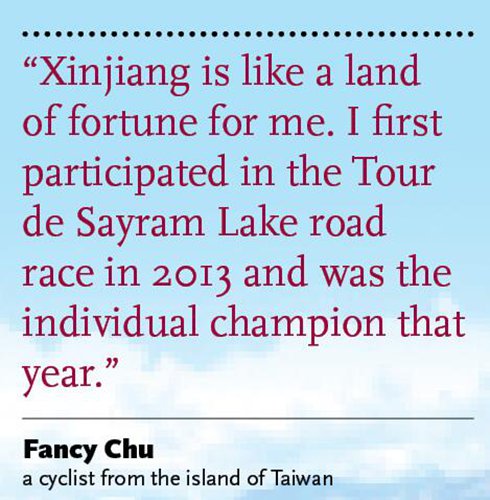
Chu's view was echoed by his fellow Taiwan compatriot Hsu Hsuan Ping.
Hsu told the Global Times, "Cycling was started in Taiwan earlier than in the mainland, but the latter has developed fast and more robustly, thus cyclists can make progress and achieve better records."
Both Chu and Hsu said that Xinjiang is a beautiful place, and great for cyclists. The natural views, the delicious food and local people's hospitality all add value and give pleasure to the participants.
"Only through competing with top cyclists can we improve. Isolation does no good to any sportsman," Wang Yuhang from Mountain Cat Gloria team told the Global Times.
Wang said that the annual race is a lot of fun for his team members, as they all have jobs. When there are races, they train, practice and compete together. Wang is a mobile phone seller, other members sell fruit, cosmetics and the others include a policeman and two civil servants.
Li Hong, the deputy general referee of the race, commented that the race had "good organization, and a better race track design helps the annual event make progress every year and become more professional, which helps participants achieve new records. It would be great if the local temporary assisting referees can improve their performances."
A motorcycle team made up of 20 members was another highlight of this year's race. They gave rides to referees or officials to key points or brought photographers to the best spots to take photos.
Alimu Mahemuti, a traffic police assistant from Urumqi, capital city of the autonomous region, traveled the farthest to Bortala to become a volunteer. The 39-year-old man from the Uyghur ethnic group told the Global Times that he had been introduced by a friend of a friend, and it was his first year there.
"It's challenging but exciting. Thanks to my family for supporting me," he said.
Night market
In Alashankou, the border port city administered by Bortala in Xinjiang, people are able to enjoy street food at night.
The city was still bright at 10.30 pm, as it is located in the far west of China.
Damudeng Surong, a reporter from Bole city in Bortala, who was covering the cycling race, shared an authentic Mongolian dinner with his local friends and peers from Shanghai.
Together with Wusu, a locally made beer, and some homemade milk wine, an unforgettable dinner was served.
Bayin, a young man from the Mongolian ethnic group, showed his hospitality by singing folk songs. The atmosphere was so good that diners at the neighboring table gave beer and food as gifts for his charming songs.
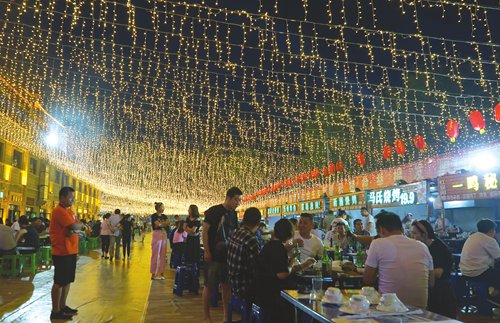
"Now, with governments at all levels paying attention to sandstorms, the sandstorm issue has been brought under control and the place has become more habitable," Bayin told the Global Times.
Modern life
The lives of local ethnic Mongolian herdsmen have also changed significantly in the past years, the Global Times learned while visiting herdsmen's families in Wenquan.
Instead of living in traditional yurts, modern Mongolian people in Bortala live in new earthquake-proof houses.
Bortala suffered a 6.6-magnitude earthquake in 2017 which damaged many houses and shelters in the region. To ensure the safety of residents, the government helped build new quake-proof houses for them.
"With the government subsidy of 38,500 yuan ($5,590), we spent about 40,000 to 50,000 yuan, and have permanent ownership of the new house. We are safe living here," Bateer, a local herdsman, told the Global Times.
"With more than 200 sheep and over 50 cattle, we no longer suffer from poverty, but we are still far from being rich. We hope to find markets for our homemade dairy products. Almost every woman can make dairy food, but we don't know how to sell them to customers outside Xinjiang," said Jiaojia, Bateer's wife.
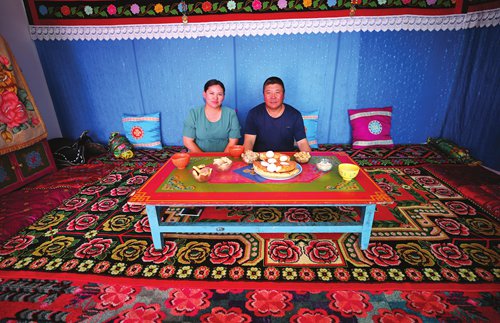
Jiaojia said that the total annual income of her family is about 150,000 yuan. But with two school-age daughters and other living costs, they could not save much money each year.
However, the couple did share some good news.
First, starting from 2019, their regional medical insurance plan was connected with prestigious hospitals in the cities of Beijing, Shanghai and Xi'an in Northwest China's Shaanxi Province. That means they do not have to worry about high medical costs if they receive treatment in other provinces. Several years ago, Bateer spent a lot of money to treat his intervertebral disc herniation.
Second, Jiaojia was happy to be recruited as a "border keeper" as Bortala has more than 370 kilometers of borders.
"In my group of 11 women from the Han, Hui, Uyghur, Mongolian and Kazakhstani ethnic groups, we stay together for seven days and nights in shifts. We inspect individuals and vehicles on the border to make sure the region is safe and secure. People from different ethnic groups get along very well."
Jiaojia is proud of the monthly 2,000 yuan salary she can earn helping maintain regional security. They support the authorities' decision to keep the region safe and united, and are aware that dangers still exist.
When asked whether the couple is willing to see their daughters study, work and develop outside Xinjiang, they replied firmly, "Yes."
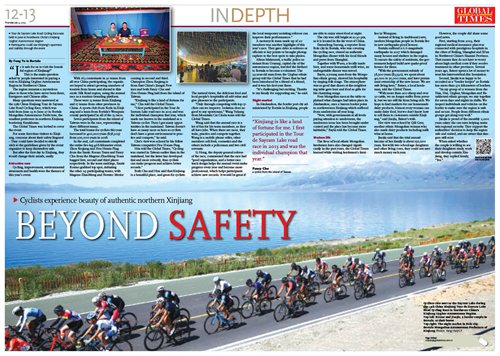
Newspaper headline: Beyond safety
○ Participants could see Xinjiang's openness and stability through the event

Cyclists race next to the Sayram Lake during the 13th China Xinjiang Tour de Sayram Lake Road Cycling Race in Northwest China's Xinjiang Uyghur Autonomous Region. Photo: Yang Hui/GT
"Is it safe for us to visit the beautiful region of Xinjiang?"This is the main question asked by people interested in paying a visit to Xinjiang Uyghur Autonomous Region in Northwest China.
The region remains a mysterious place to those who have never been there, foreigners and Chinese alike.
Many questions were answered at the 13th China Xinjiang Tour de Sayram Lake Road Cycling Race, which was held from June 23 to June 27 in Bortala Mongolian Autonomous Prefecture, the smallest prefecture in northern Xinjiang bordering Kazakhstan.
The Global Times was invited to cover the event.
For some first-time visitors to Xinjiang, concerns about their safety lingered - They could have decided to strictly stick to the guidelines given by the event organizer to keep themselves safe.
But after the first day in Xinjiang, they would change their minds, easily.
Attractive race
Cycling, improvement, environmental awareness and health were the themes of this year's event.
With 163 contestants in 30 teams from all over China participating, the organizers hoped to attract growing numbers of tourists from home and abroad to this exotic Silk Road region, using the annual race as a tourism branding platform.
There were 13 teams from Xinjiang and 17 teams from other provinces in China. A sports club from Korla in Xinjiang and a team from Bortala's Wenquan county participated in all of the 13 races.
Seven participants from the island of Taiwan were in the race, representing three different teams.
The total bonus for cyclists this year increased to 400,000 yuan ($58,309) from 300,000 yuan in 2018.
In the end, 128 contestants completed the entire five-leg 468-kilometer event. Zhou Keqiang and Hsu Hsuan Ping from the Santic Kosmo Team and Fancy Chu from the Magene-ZhaoMeng Team bagged first, second and third places respectively. In the team rankings, Santic Kosmo grabbed top spot, defeating the other 29 participating teams, with Magene-ZhaoMeng and Novatec Merior coming in second and third. Champion Zhou Keqiang is from East China's Jiangxi Province and both Fancy Chu and Hsu Hsuan Ping hail from the island of Taiwan.
"Xinjiang is like a land of fortune for me," Chu told the Global Times.

"I first participated in the Tour de Sayram Lake road race in 2013 and was the individual champion that year, which made me known in the mainland as a Taiwan cyclist. Then I got many opportunities in the mainland. Taiwan doesn't have as many races as here so cyclists don't have a great environment to practice and compete," he said.
Chu's view was echoed by his fellow Taiwan compatriot Hsu Hsuan Ping.
Hsu told the Global Times, "Cycling was started in Taiwan earlier than in the mainland, but the latter has developed fast and more robustly, thus cyclists can make progress and achieve better records."
Both Chu and Hsu said that Xinjiang is a beautiful place, and great for cyclists. The natural views, the delicious food and local people's hospitality all add value and give pleasure to the participants.
"Only through competing with top cyclists can we improve. Isolation does no good to any sportsman," Wang Yuhang from Mountain Cat Gloria team told the Global Times.
Wang said that the annual race is a lot of fun for his team members, as they all have jobs. When there are races, they train, practice and compete together. Wang is a mobile phone seller, other members sell fruit, cosmetics and the others include a policeman and two civil servants.
Li Hong, the deputy general referee of the race, commented that the race had "good organization, and a better race track design helps the annual event make progress every year and become more professional, which helps participants achieve new records. It would be great if the local temporary assisting referees can improve their performances."
A motorcycle team made up of 20 members was another highlight of this year's race. They gave rides to referees or officials to key points or brought photographers to the best spots to take photos.
Alimu Mahemuti, a traffic police assistant from Urumqi, capital city of the autonomous region, traveled the farthest to Bortala to become a volunteer. The 39-year-old man from the Uyghur ethnic group told the Global Times that he had been introduced by a friend of a friend, and it was his first year there.
"It's challenging but exciting. Thanks to my family for supporting me," he said.
Night market
In Alashankou, the border port city administered by Bortala in Xinjiang, people are able to enjoy street food at night.
The city was still bright at 10.30 pm, as it is located in the far west of China.
Damudeng Surong, a reporter from Bole city in Bortala, who was covering the cycling race, shared an authentic Mongolian dinner with his local friends and peers from Shanghai.
Together with Wusu, a locally made beer, and some homemade milk wine, an unforgettable dinner was served.
Bayin, a young man from the Mongolian ethnic group, showed his hospitality by singing folk songs. The atmosphere was so good that diners at the neighboring table gave beer and food as gifts for his charming songs.

The night market in Bole city, Bortala Mongolian Autonomous Prefecture of Xinjiang Photo: Yang Hui/GT
Four Mongolian men at the table explained what changes had taken place in Alashankou, once a barren border point in northwestern Xinjiang which suffered from sandstorms all year long."Now, with governments at all levels paying attention to sandstorms, the sandstorm issue has been brought under control and the place has become more habitable," Bayin told the Global Times.
Modern life
The lives of local ethnic Mongolian herdsmen have also changed significantly in the past years, the Global Times learned while visiting herdsmen's families in Wenquan.
Instead of living in traditional yurts, modern Mongolian people in Bortala live in new earthquake-proof houses.
Bortala suffered a 6.6-magnitude earthquake in 2017 which damaged many houses and shelters in the region. To ensure the safety of residents, the government helped build new quake-proof houses for them.
"With the government subsidy of 38,500 yuan ($5,590), we spent about 40,000 to 50,000 yuan, and have permanent ownership of the new house. We are safe living here," Bateer, a local herdsman, told the Global Times.
"With more than 200 sheep and over 50 cattle, we no longer suffer from poverty, but we are still far from being rich. We hope to find markets for our homemade dairy products. Almost every woman can make dairy food, but we don't know how to sell them to customers outside Xinjiang," said Jiaojia, Bateer's wife.

Bateer and Jiaojia, a herder couple in Bortala, at their home Photo: Yang Hui/GT
Her view was echoed by Qili Geer, another ethnic Mongolian woman who also made dairy products including milk wine at home.Jiaojia said that the total annual income of her family is about 150,000 yuan. But with two school-age daughters and other living costs, they could not save much money each year.
However, the couple did share some good news.
First, starting from 2019, their regional medical insurance plan was connected with prestigious hospitals in the cities of Beijing, Shanghai and Xi'an in Northwest China's Shaanxi Province. That means they do not have to worry about high medical costs if they receive treatment in other provinces. Several years ago, Bateer spent a lot of money to treat his intervertebral disc herniation.
Second, Jiaojia was happy to be recruited as a "border keeper" as Bortala has more than 370 kilometers of borders.
"In my group of 11 women from the Han, Hui, Uyghur, Mongolian and Kazakhstani ethnic groups, we stay together for seven days and nights in shifts. We inspect individuals and vehicles on the border to make sure the region is safe and secure. People from different ethnic groups get along very well."
Jiaojia is proud of the monthly 2,000 yuan salary she can earn helping maintain regional security. They support the authorities' decision to keep the region safe and united, and are aware that dangers still exist.
When asked whether the couple is willing to see their daughters study, work and develop outside Xinjiang, they replied firmly, "Yes."

Newspaper headline: Beyond safety
Posted in: IN-DEPTH,FEARTURED STORIES